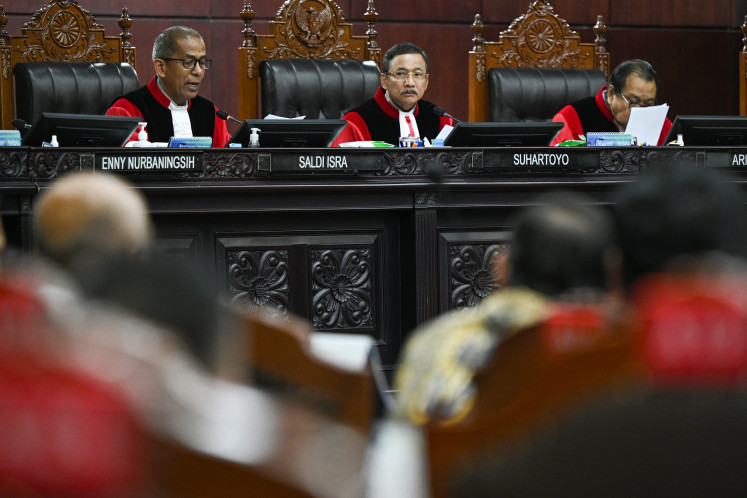Popular Reads
Top Results
Can't find what you're looking for?
View all search resultsPopular Reads
Top Results
Can't find what you're looking for?
View all search resultsWest Java to welcome Grab electric scooters, bikes, cars
As people are becoming more open to alternative modes of transportation, ride-hailing app provider Grab has struck a partnership with the West Java administration to introduce a feature on its app that enables the public to rent electric scooters and order electric car rides.
Change text size
Gift Premium Articles
to Anyone
 Joyride: Grab Indonesia president director Ridzki Kramadibrata (right) rides a GrabWheels electric scooter as Sinar Mas Land head of business development and innovations Djemi Lim (left), Sinar Mas Land digital hub project leader Irawan Harahap (second left) and Grab Indonesia executive director Ongki Kurniawan (third left) look on at the launch of GrabWheels in BSD City, South Tangerang, Banten. (JP/Dhoni Setiawan)
Joyride: Grab Indonesia president director Ridzki Kramadibrata (right) rides a GrabWheels electric scooter as Sinar Mas Land head of business development and innovations Djemi Lim (left), Sinar Mas Land digital hub project leader Irawan Harahap (second left) and Grab Indonesia executive director Ongki Kurniawan (third left) look on at the launch of GrabWheels in BSD City, South Tangerang, Banten. (JP/Dhoni Setiawan)
As people are becoming more open to alternative modes of transportation, ride-hailing app provider Grab has struck a partnership with the West Java administration to introduce a feature on its app that enables the public to rent electric scooters and order electric car rides.
West Java Governor Ridwan Kamil said the administration had opted to collaborate with Grab considering the company’s readiness for electric vehicles.
“We’ll work things out to give the public more transportation options. They won’t be regular cars or motorcycles. Those who want to go on short trips will have the option of electric mobility,” Ridwan said on Monday.
He went on to say that the administration, in collaboration with Grab, would run a public trial for the electric scooters in several cities and tourist destinations across West Java. The cities currently in consideration for such trials included Bandung, Bogor, Cirebon and Pangandaran, he said.
“We’d like to gauge the public response by conducting these test runs,” Ridwan added.
Grab has previously run a public trial for its electric scooters in several areas across Jakarta. Grab Indonesia president Ridzki Kramadibrata said the company would provide varying numbers of electric scooters in the trial areas.
“In addition to scooters, we’ll also provide electric bikes. A single trial area may provide 10 to 20 [electric scooters and bikes],” Ridzki said.
He said the partnership with the West Java administration would also entail supporting small and medium enterprises (SMEs) in the region. To date, Grab had teamed up with at least 5 million SMEs across the country, he added.
“We also discussed food services like Grab Kitchen. We will enable merchants in Bandung to expand their businesses to other regions or even abroad – to Kuala Lumpur, Malaysia and Singapore, for example,” Ridzki said.
Ridwan called on Grab to support the administration’s established programs, such as Digital Village, One Village One Company and One Pesantren (Islamic boarding school) One Product.
“We need the company’s innovation in mobility. Grab’s transportation system will allow villagers to move around their goods more easily,” he said, adding that he expected the company to also complement its services in the region with its ubiquitous digital payment feature.
Ridzki went on to say that Grab had been coordinating with several state institutions to roll out its electric car program.
“We’re ready to launch (the feature), but it needs a pilot test first,” he said. “We’re currently focused on preparing the pilot test, in accordance with the Presidential Decree on electric vehicles.”
He said the forthcoming feature would be identical to the current GrabCar option, the only difference being that it would automatically hail electric cars in the user’s vicinity.
“Recharging electric cars is a more cost-effective option [than refueling]. However, we’ve noticed that electric cars are [more expensive than conventional cars],” Ridzki said. (rfa)









